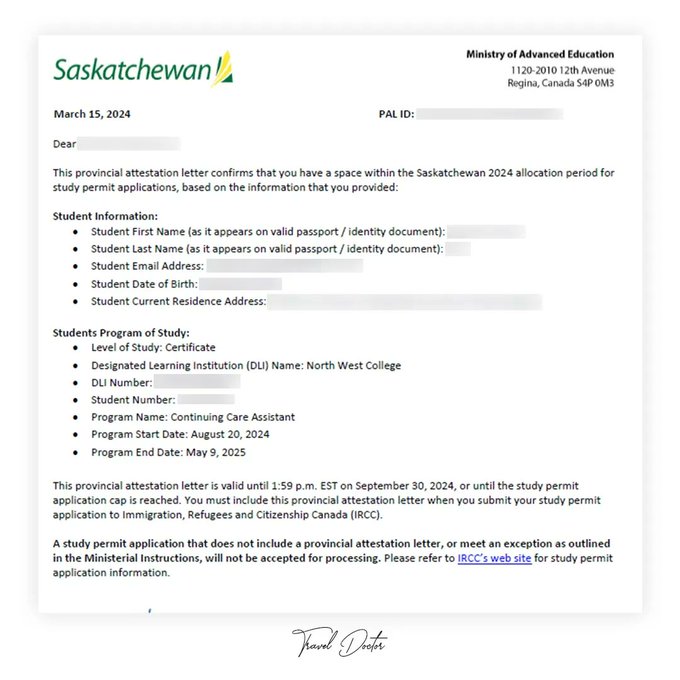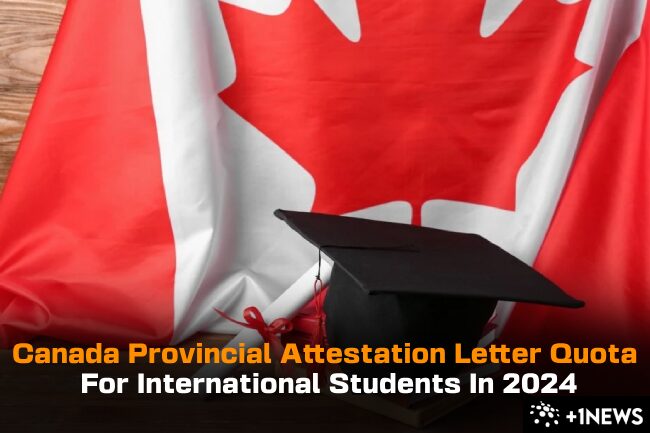In January 2024, Canada announced a new cap on the number of international students for the next two years.
Canada has introduced a new system to manage the influx of international students through the introduction of the Provincial Attestation Letter (PAL). To apply, students need a letter called Provincial Attestation Letter (PAL), from the province they want to study in.
This year, Canada is allowing about 360,000 international students to get study permits. That’s 35% less than last year.
The implementation of capping at the provincial level is primarily based on the population of each province. Most provinces have announced their annual allocations for 2024, which are monitored through provincial attestation letters.
What is a Provincial Attestation Letter (PAL)?
If you submitted your study permit application post 8:30 a.m. EST on January 22, 2024, you might need to give a letter from the province or territory where you plan to study. This letter is called a provincial attestation letter.
The PAL is a mandatory document for international students wishing to study in Canada. This measure has been introduced to ensure a balanced distribution of international students across the country, aligning with each province’s population and educational capacity.
Jump to:
Province-Wise Annual Allocations For Study Permits In 2024
Each province in Canada has been allocated a certain number of PALs, which directly correlates to the number of international students they can welcome. Here’s a breakdown:
Alberta
In Alberta, the issuance of PALs commenced on March 1, 2024. While the exact allocation of study permit approvals remains undisclosed, it’s reported that Alberta will distribute a total of 41,000 provincial attestation letters across the province.
Similar to procedures in other provinces, educational institutions in Alberta are tasked with obtaining PALs from the provincial authority for students applying for study permits.

British Columbia
In 2024, British Columbia has been allocated an 83,000 quota for undergraduate study permit applications, down from approximately 97,000 in 2023.
Recent acceptance rates suggest that the federal government expects around 50,000 international student approvals for 2024, a decrease from the 60,000 approvals seen in 2023.
Click here to learn more about Provincial Attestation Letters Issued by British Columbia and Alberta

Manitoba
Manitoba started its PAL system on March 4th, with 15,233 being the designated number for PALs. For further information on the PAL process, students are encouraged to reach out to their selected Designated Learning Institution (DLI).
Before applying for a study permit in Manitoba, you must contact your educational institution to request a PAL, along with a letter of acceptance.

Ontario
Ontario has been allotted 235,000 PALs for 2024. PALs correspond to study permit applications, yet this allocation doesn’t ensure approval by the IRCC for all applications.
Hence, the anticipated total of approved study permits is likely to be lower than the PAL figure mentioned.
Based on a historical approval rate of 60%, it is estimated that the 235,000 applications will yield approximately 141,000 new study permits for cap-affected students in 2024.

Saskatchewan
In Saskatchewan, 12,000 provincial attestation letters have been allocated for distribution among prospective international students in 2024.
To be eligible, students must initially apply to their preferred institution and secure a letter of acceptance.
Upon acceptance of their application, the institution will inform the Ministry of Advanced Education.
Subsequently, the Government of Saskatchewan will automate the issuance of PALs, notifying students once their PAL becomes accessible.

Nova Scotia
Nova Scotia has been allotted 12,900 applications for the year 2024, marking a decrease of approximately 7,000 compared to the previous year’s total submissions.
Of this allocation, 11,565 applications (90%) will be distributed among the province’s ten institutions and Nova Scotia Community College.
The remaining 710 applications are earmarked for a dozen private career colleges, while 526 are designated for nine language schools. Additionally, 99 application slots are reserved for unexpected circumstances and new programs.
Reports indicate that Cape Breton University (CBU) has experienced a significant 52% decrease in applications, resulting in a total of 5,086.
Mount Saint Vincent University (MSVU) anticipates a 44% decline in student numbers, with a projected total of 860 enrollees, while Université Ste-Anne expects a 34% decrease, bringing their total to 962 students.
Newfoundland and Labrador
Starting March 19th, Newfoundland and Labrador have initiated the issuance of PALs (Provincial Approval Letters) through their systems, with a quota set at 2,365.
International students aspiring to pursue studies in Newfoundland and Labrador are now eligible to acquire their PAL.
To procure a PAL, students are required to reach out to their desired educational institution within the province.
The school assumes the responsibility of applying for the PAL on behalf of the student and furnishing a copy once the process is completed.
New Brunswick
On March 18, New Brunswick launched its PAL system. Students, akin to those in other provinces, are required to reach out to their designated DLI to understand PAL application criteria.
New Brunswick has been allocated a quota of 9,279 provincial attestation letters for 2024.
In certain cases, schools might ask international students for a deposit fee upon receipt of a LOA, after which the school will handle the PAL application process on their behalf.
To obtain your PAL in New Brunswick, kindly reach out directly to your school, as they are responsible for both the application and issuance of the PAL.
Prince Edward Island
According to media reports, Prince Edward Island is slated to receive approximately 2,000 PALs for the year 2024.
How to Obtain Your Provincial Attestation Letter?
The process to obtain a provincial attestation letter varies slightly by province but follows a general pathway:
- Apply to a Canadian educational institution and receive a letter of acceptance.
- The institution will then assist or guide you in applying for a PAL from the provincial authority.
- Await the issuance of your PAL, which will be critical for your study permit application.
- It’s essential to contact your chosen educational institution for detailed guidance on their specific PAL application process.
Exemptions for International Students’ Caps and PALs in Canada
You don’t need a Provincial Attestation Letter if you are:
- Primary and secondary school students
- Master’s or doctoral degree students
- Individuals already in Canada on a valid study or work permit, along with their in-Canada family members
- Students applying for an extension of their study permit within Canada














